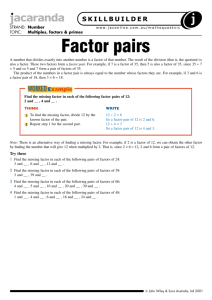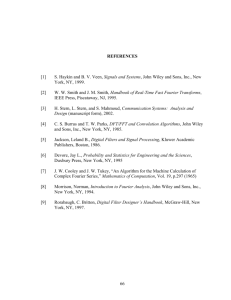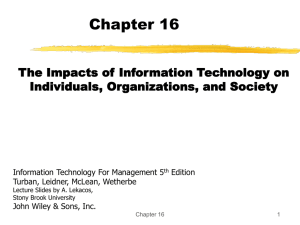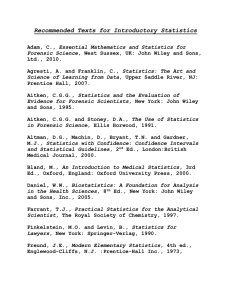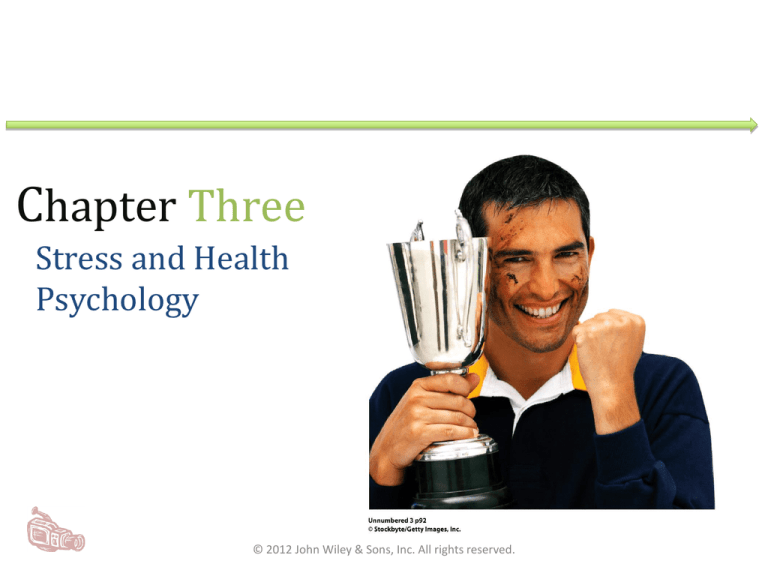
Chapter Three
Stress and Health
Psychology
© 2012 John Wiley & Sons, Inc. All rights reserved.
UNDERSTANDING STRESS
© 2012 John Wiley & Sons, Inc. All rights reserved.
Defining Stress
Stress
Nonspecific response of
the body to any demand
made upon it; the arousal,
both physical and mental,
to situations or events
that we perceive as
threatening or challenging
Stressor
Trigger or stimulus that
prompts a stressful
reaction
Eustress
Pleasant, desirable stress
Distress
Unpleasant, threatening
stress
WILEY VIDEO
© 2012 John Wiley & Sons, Inc. All rights reserved.
Stress
Changes
Your Brain
Seven Major
Sources of Stress
© 2012 John Wiley & Sons, Inc. All rights reserved.
Sources of Stress: Life Changes
Life Changes
Holmes and Rahe believed
that adjusting to major life
changes causes some degree
of stress.
The Social Readjustment
Rating Scale measures the
magnitude of the stress and
those scores have been
correlated with illness.
© 2012 John Wiley & Sons, Inc. All rights reserved.
Measuring YOUR Life Changes!
© 2012 John Wiley & Sons, Inc. All rights reserved.
Sources of Stress:
Chronic Stressors
Chronic Stressors
State of ongoing arousal in
which the parasympathetic
system cannot activate the
relaxation response.
How do YOU manage
the ongoing threats of
increasing tuition,
quizzes, exams, and
term papers, while
also holding down a
part- or full-time jobs?
WILEY VIDEO
Smoking,
Stress, and
Gender
© 2012 John Wiley & Sons, Inc. All rights reserved.
Source of Stress: Job Stressors
Job Stressors
Work-related stress, including
unemployment, role conflict, and
burnout
Role Conflict
Forced choice between two or more
different and incompatible role
demands
Unemployment
Keeping/changing jobs
Job performance
Lack of control
Burnout
State of psychological and physical
exhaustion resulting from chronic
exposure to high levels of stress and
little personal control
Burnout occurs in idealistic
people involved in stressful
and emotionally draining
professions
© 2012 John Wiley & Sons, Inc. All rights reserved.
Source of Stress: Hassles
Hassles
Small problems of daily living
that accumulate and
sometimes become a major
source of stress
Insert psychology engages from page
97 beginning with “The 10 Most
Common Hassles for College
Students”, not the caption or
picture!
Some believe that hassles are
often more significant in
creating stress than major live
events.
© 2012 John Wiley & Sons, Inc. All rights reserved.
WILEY VIDEO
Student
Drinking
Source of Stress: Frustration
The more
motivated we are,
the more frustration
we experience
when our goals are
blocked.
Frustration
Unpleasant tension, anxiety,
and heightened sympathetic
activity resulting from a
blocked goal
How might you feel if you did
not get the job you wanted?
© 2012 John Wiley & Sons, Inc. All rights reserved.
Sources of Stress: Conflict
© 2012 John Wiley & Sons, Inc. All rights reserved.
Source of Stress:
Cataclysmic Events
Cataclysmic Events
Stressful occurrences that
occur suddenly and generally
affect many people
simultaneously.
© 2012 John Wiley & Sons, Inc. All rights reserved.
Biological Response, The Immune System, Cognitive Functioning & PTSD
THE EFFECTS OF STRESS
© 2012 John Wiley & Sons, Inc. All rights reserved.
Biological Response:
General Adaptation Syndrome
© 2012 John Wiley & Sons, Inc. All rights reserved.
Biological Response: SAM and
HPA
ANIMATION
Managing
Stress
© 2012 John Wiley & Sons, Inc. All rights reserved.
Biological Response: SAM and
HPA
© 2012 John Wiley & Sons, Inc. All rights reserved.
Stress and the Immune System
Psychoneuroimmunology
Interdisciplinary field that studies the
effects of psychological and other
factors on the immune system
The biological response to stress
changes the activity of the immune
system, increasing the risk of:
Cancer
Periodontal Disease
Common Cold
Bursitis
Colitis
Rheumatoid Arthritis
Alzheimer’s
© 2012 John Wiley & Sons, Inc. All rights reserved.
Stress and Cognitive Functioning
Cortisol Effects on the Brain
SHORT TERM: Cortisol also can
prevent the retrieval of existing
memories, as well as the laying down
of new memories
LONG TERM: Prolonged stress can
permanently damage the
hippocampus, a key part of the brain
involved in memory. Once damaged,
it cannot provide proper feedback to
the hypothalamus, so cortisol
continues to be secreted and a
vicious cycle can develop
© 2012 John Wiley & Sons, Inc. All rights reserved.
Stress and Cancer
The immune system in action
Stress can compromise the immune system,
and the actions of a healthy immune system
are shown here. The round red structures are
leukemia cells. Note how the yellow killer cells
are attacking and destroying the cancer cells.
© 2012 John Wiley & Sons, Inc. All rights reserved.
Stress and
Cardiovascular Disease
Fatty deposits in arteries
One major cause of heart disease is the blockage of
arteries that supply blood to the heart. The artery on
the left is normal; the one on the right is almost
completely blocked. Reducing stress, exercising, and
eating a low-fat diet can help prevent the buildup of
fatty deposits in the arteries.
WILEY VIDEO
© 2012 John Wiley & Sons, Inc. All rights reserved.
Mending
Broken
Hearts
Personality Characteristics and
Cardiovascular Disease
Type-A Personality Behavior
characteristics including intense
ambition, competition, exaggerated
time urgency, and a cynical, hostile
outlook
Type-B Personality Behavior
characteristics consistent with a
calm, patient, relaxed attitude
Cynical hostility is the strongest
predictor of heart disease!
© 2012 John Wiley & Sons, Inc. All rights reserved.
Are You Type A or Type B?
Write down the number on the scale below that best characterizes your behavior for each
trait. Total your score and then multiply by 3.
1. Casual about appointments
12345678
Never late
2. Not competitive
12345678
Very competitive
3. Never feel rushed
12345678
Always rushed
4. Take things one at a time
12345678
Try to do many things at once
5. Slow doing things
12345678
Fast (eating, walking, etc.)
6. Express feelings
12345678
“Sit" on feelings
7. Many interests
12345678
Few interests outside work
© 2012 John Wiley & Sons, Inc. All rights reserved.
Personality Characteristics and
Positive Psychology
Hardiness
Developing Hardiness
Resilient personality with a strong
commitment to personal goals,
control over life, and viewing change
as a challenge rather than a threat.
Next time you have four exams in one week,
try using the 3 C’s:
Important:
Hardiness is a learned behavior!!
I can control the number of tests by taking
one or two of them earlier than scheduled, or
I can rearrange my work schedule.
I am fully committed to my college education.
I welcome this challenge as a final motivation
to enroll in those reading improvement and
college success courses I’ve always planned to
take.
© 2012 John Wiley & Sons, Inc. All rights reserved.
“Nothing can bring you happiness but yourself” (Ralph
Waldo Emerson)
2) Signature Strengths
1) Three good things in life
Write down three things that went well
each day and their causes every night for
one week
Using signature strengths in a new way.
First, take the inventory of character
strengths online at
www.authentichappiness.org and receive
individualized feedback about your top
five (“signature”) strengths (Peterson et
al., 2005a). Use one of these top
strengths in a new and different way
every day for one week. Write it down.
3) Mindful Awareness is the moment-by-moment process of actively and openly
observing one’s physical, mental and emotional experiences. Mindful Awareness has
scientific support as a means to reduce stress, improve attention, boost the immune
system, reduce emotional reactivity, and promote a general sense of health and well-
being.
© 2012 John Wiley & Sons, Inc. All rights reserved.
Post-Traumatic Stress Disorder
PTSD
Anxiety disorder following
exposure to a life-threatening
or other extreme event that
evoked great horror or
helplessness; characterized by
flashbacks, nightmares, and
impaired functioning
70% of adults have
experienced a severe
traumatic event
20% of them develop
symptoms of PTSD
© 2012 John Wiley & Sons, Inc. All rights reserved.
© 2012 John Wiley & Sons, Inc. All rights reserved.
WILEY VIDEO
WILEY VIDEO
9/11 PTSD
Therapy
Post Trauma
Drugs
Research Challenge:
Does Stress Cause Gastric Ulcers?
First, ulcers were caused by
stress, then by bacteria; now
what??
Read the description of the
series of studies on page 110
and answer the questions to
your right!
What does this series of
studies mean about the
CAUSES of ulcers?
Answer these questions!
1. Hypothesis?
2. Research method (experimental,
descriptive, correlational, or biological)?
3. If you chose the:
Experimental method—label the IV, DV,
experimental group, and control group.
Descriptive method—is this a naturalistic
observation, survey, or case study?
Correlational method—is this a positive,
negative, or zero correlation?
Biological method—identify the specific
research tool (e.g., brain dissection, CT
scan, etc.).
© 2012 John Wiley & Sons, Inc. All rights reserved.
HEALTH PSYCHOLOGY AND
STRESS MANAGEMENT
© 2012 John Wiley & Sons, Inc. All rights reserved.
Health Psychology
Health Psychologists:
Help prepare people for
surgery or other treatment
Educate the public about
effects of stress, smoking,
alcohol, and lack of exercise
Help people cope with
chronic illness
Help people change
Studies how biological,
unhealthy behaviors such as
psychological, and social factors
anger expression
interact in health and fitness
WILEY VIDEO WILEY VIDEO
Health Psychology
© 2012 John Wiley & Sons, Inc. All rights reserved.
Buzzed
Brain
Alcohol
and Ads
Cognitive Appraisal
and Coping
© 2012 John Wiley & Sons, Inc. All rights reserved.
For Each Situation, Suggest Both an Emotionfocused and a Problem-focused Strategy
1. You are terrible at making introductions,. You walk into your first day of fraternity rush and are asked to go
around the room and introduce everyone.
2. It is the first day of classes and you are an entering freshman. About five minutes into your first class you realize
you are in classroom 242, not 424. This is a physics class, not a psychology class.
3. Your department chairman has just told you that in three hours you are to make your first major presentation to
the faculty to ask for continued funding for your department.
4. Your significant other has just told you that he/she is in love with someone else, is moving out tonight and is
getting married next August, but wants to still be friends.
5. Your car has stalled on a deserted country road; before you can get out of your car to check under the hood,
two large dogs run up to your door and start barking and growling at you.
6. Your car insurance has just been cancelled because of a mistake in your driving record.
7. You are the owner of a professional hockey team that has just lost eight games in a row.
8. You have just finished entering a twenty-page paper into your word processor thatis due in one hour. Before you
have a chance to print out the report, the electrical power in your room fails and you lose the entire paper.
© 2012 John Wiley & Sons, Inc. All rights reserved.
WILEY VIDEO
Anti-Stress
Video Game
WILEY VIDEO
Stronger
Brains
WILEY VIDEO
© 2012 John Wiley & Sons, Inc. All rights reserved.
Older
Women and
Exercise
© 2012 John Wiley & Sons, Inc. All rights reserved.
“Karoshi”—Can Job
Stress be Fatal?
© 2012 John Wiley & Sons, Inc. All rights reserved.
Multimedia
ScienCentral News
9/11 PTSD Therapy (1:42)
We know them as heroes, but many of the first
responders who survived 9/11 felt far from heroic.
Instead ,they were shattered by post-traumatic
stress. But some have been helped by a different sort
of rapid response team.
© 2012 John Wiley & Sons, Inc. All rights reserved.
Multimedia
CyberPsych Animations
Managing Stress Improves Health (5:51)
This animation briefly describes the General
Adaptation Response, along with the SAM and HPA
responses to a stressor. After indicating that this
response is related to poor health outcomes, it
provides examples of multiple stress -reduction
techniques.
© 2012 John Wiley & Sons, Inc. All rights reserved.
Multimedia
Web Video
Stress: Portrait of a Killer (4:39)
This is a preview to Sapolsky’s fascinating work on stress. As
we’ve evolved, the human stress response has saved our lives.
Today, we turn on the same life-saving physical reaction to
cope with intense, ongoing stressors —and we can’t seem to
turn it off. “Stress: Portrait of a Killer” reveals just how
dangerous prolonged exposure to stress can be.
The full-length video is on the YouTube slide—well worth the
time!
This Emotional Life: Understanding PTSD (3:00)
Dr. Barbara Rothbaum is the Director of the Trauma and
Anxiety Recovery Program at Emory University School of
Medicine. In this video, she answers the following three
questions: What is PTSD? What are the symptoms of PTSD?
Can PTSD be treated?
Soldiers Who Turn to Drugs and Alcohol (3:32)
ABC News reports on the relationship among stress, PTSD and
the use of alcohol and other drugs. This brief report features
interviews with soldiers who have experienced traumatic
events.
Emotions, Stress and Health (10: 58)
This segment from The Brain teaching modules features
commentary from scientists, dramatic reenactments, and
graphic illustrations of the consequences of prolonged stress
on health. Animated diagrams show the brain releasing
hormones, followed by a role-playing situation illustrating onthe-job stress that may set this process in motion.
Researchers explain how low-level stress leads to the
breakdown of frontal lobe functioning.
The World of Abnormal Psychology: The Nature of
Stress (58:26)
We see that stress affects many people—from the
overworked and out-of-work, to survivors of suicide and
homicide, to Vietnam War veterans who continually reexperience the stress of the battlefield. The program explores
the long-term effects of stress and what is known about how
to reduce them.
© 2012 John Wiley & Sons, Inc. All rights reserved.
Multimedia
Psychology on the Web
Mindful Awareness Research Center (5.00)
This podcast leads you and your class through a short
introductory mindfulness meditation.
© 2012 John Wiley & Sons, Inc. All rights reserved.
Multimedia
Web Video
We know that YouTube videos are less stable . So we have not embedded them in the PPT
slide show, but offer the links, for your viewing pleasure at the end, on this page.
National Geographic: Stress: Portrait of a Killer
(56:05)
Scientists are showing just how measurable —and
dangerous—prolonged exposure to stress can be. Stanford
University neurobiologist, MacArthur "genius" grant recipient,
and renowned author Robert Sapolsky reveals new answers to
why and how chronic stress is threatening our lives in Killer
Stress, a National Geographic Special. The hour-long coproduction of National Geographic Television and Stanford
University was made for public television.
http://www.youtube.com/watch?v=P7K_1XTvUz0
Music Video: Black Eyed Pea: Anxiety (1:40)
This song exemplifies the insidious nature of anxiety, a great
unit starter—lyrics found in the comments portion of slide #1.
http://www.youtube.com/watch?v=pd7S3HCvoDQ
© 2012 John Wiley & Sons, Inc. All rights reserved.

